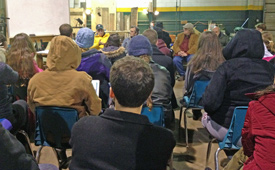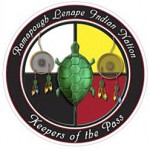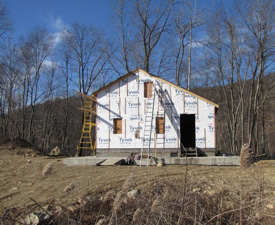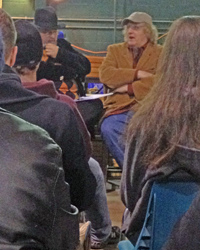In an unheated warehouse space, chairs and benches were pulled together in neat rows. Students from Antioch University and Ramapo College sat bundled against the encroaching chill, listening intently to a panel discuss the complex process of how stories bring us together as people and keep us apart — and how these stories actually shape the way we live our lives. The gathering near the foot of Torne Mountain brought future environmental educators into the heart of an on-going local story that is reflective of stories told all across the country. How a small voice — in this case, the Ramapough-Lenape people — rises up against many odds to be heard.
 The Friday night gathering was part of a weekend of education hosted by Chuck Stead, environmental educator with Cornell Cooperative Extension. The warehouse panel kicked off the weekend workshop intended to immerse the visiting students in the history of the Ramapough-Lenape and how their fight to protect their Ramapo Mountain homeland dovetails precisely with important environmental issues that effect a much larger population.
The Friday night gathering was part of a weekend of education hosted by Chuck Stead, environmental educator with Cornell Cooperative Extension. The warehouse panel kicked off the weekend workshop intended to immerse the visiting students in the history of the Ramapough-Lenape and how their fight to protect their Ramapo Mountain homeland dovetails precisely with important environmental issues that effect a much larger population.
The weekend workshop, titled Diversity, Justice & Inclusion, is set to explore front-line issues at the heart of many environmental efforts that include prejudice, resistance and denial. Stead’s Saltbox House project ties many of these issues together — it will serve as both history museum to early Ramapo life and industry and as field research center that examines the long-range impact of watershed paint sludge contamination, the result of Ford Motor Company’s dumping around Ramapo and the Torne Mountain watershed during the 1960’s and 70’s.
 The project registers the impact and changes to the land in the Ramapo watershed over the last 200 years.
The project registers the impact and changes to the land in the Ramapo watershed over the last 200 years.
The Ramapough-Lenape are central to that story. Living quietly in the Rampo Mountains in and around Stag Hill, they were the first to notice and bring voice to the Ford contamination issue. Most recently, they’ve taken action against the El Paso pipeline expansion, which involves the Tennessee Gas Company expanding its gas pipeline across the Ramapos and taking public parkland for private use. Additionally, Algonquin Gas Company, a subsidiary of Spectra Energy, is preparing the expansion of its gas pipeline along the crest of the Ramapos from Pompton Lakes to the New York state border.
“Their land’s going to be cut right through over there on Stag Hill,” Stead said. “They’re looking to stop it. Their struggling little nation, half of them dying from Ford’s contamination, and they want to take on El Paso. El Paso will be plugging directly into what will be the fracking industry in upstate New York.”
 Jan Barry, Friday night panel member and head writer on the Bergen Record’s Toxic Legacy series on the Ford contamination, touched on the hard work it takes to bring individual stories to light. First you have to get them told. They usually first fall on deaf ears. But, as in the case of the Ford sludge contamination, eventually people hear and the truth gets out.
Jan Barry, Friday night panel member and head writer on the Bergen Record’s Toxic Legacy series on the Ford contamination, touched on the hard work it takes to bring individual stories to light. First you have to get them told. They usually first fall on deaf ears. But, as in the case of the Ford sludge contamination, eventually people hear and the truth gets out.
“Some of that stuff was so toxic they didn’t have a place to dump it here in the United States,” Barry said. He told a story of following the Ford trucks all the way to Canada to see where they drop their load. “Guess who lived next door to where they dumped it? The dumped it right next to the natives.” Thus it begins again in someone else’s back yard, starting the cycle over again.
 Harmony Hall Curator and local activist Geoff Welch also served on the panel. One of Welch’s earliest roles in the area was fighting to get the Ramapo landfill closed. Welch was asked how to balance the message and still be effective when catching slings and arrows from both sides. Stead said that in his long years of knowing Welch, he’s seen him wooed by politicians, then condemned, then wooed again. Welch’s basic message to the students — do your homework and have science and facts on your side. Plus patience, plenty of patience.
Harmony Hall Curator and local activist Geoff Welch also served on the panel. One of Welch’s earliest roles in the area was fighting to get the Ramapo landfill closed. Welch was asked how to balance the message and still be effective when catching slings and arrows from both sides. Stead said that in his long years of knowing Welch, he’s seen him wooed by politicians, then condemned, then wooed again. Welch’s basic message to the students — do your homework and have science and facts on your side. Plus patience, plenty of patience.
The workshop continues throughout the weekend, with the students hiking through the Torne Valley watershed Saturday morning and meeting with a contingent from the Ramapough-Lenape, including Chief Perry and other Council Members.
“There’ll be six council members to tell their story,” Stead said. “And their story isn’t just pain, it’s a lot of things that have been consistent with their plight and it continues right up to the El Paso pipeline story.”
“They’re really remarkable people,” Stead continued. “They just want to continue to save their people — the way they see it, they want to save their people and the earth. So, the people are impacted, traditonally the indians the most, and the earth is impacted. Nobody seems to object to that. And they want to put the two together.”
The Weekend Workshop with Antioch University and Ramapo College continues through Sunday with tours along the Torne Valley and Ramapo River; a visit to the future Saltbox Environmental Research Center; and meetings with Ramapough-Lenape Chief Perry and Council Members; a Saturday night Saltbox Social; and a Sunday meeting at the Community Center Council House on Stag Hill in Mahwah.


